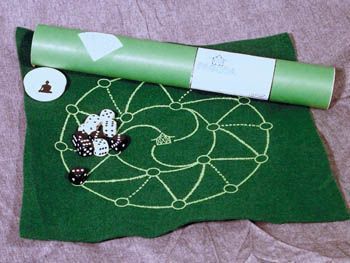Pagoda (2001) Board Game
Pagoda is an abstract strategy board game designed by Pair-of-Dice Games and released in in 2001. It is a two-player game that involves dice rolling and strategic placement of pieces to build structures. The game has a runtime of about 20 minutes and is recommended for players aged 12 and above.
Game Components of Pagoda
How To Setup Pagoda
To set up Pagoda, start by placing the game board horizontally between the players. Each player chooses a color and takes the 6 wooden markers of that color, placing one marker on the 0 space of the victory points track. Each player then takes an Architect board and places the remaining 5 markers on the 5 leftmost spaces of their board. Sort the pagoda tiles by color and place them next to the game board, along with the wooden columns. Each player draws one card of each color to form their open display and then draws two additional cards from the draw pile to form their hand. The player who last ate with chopsticks takes the start player marker.
Gameplay Mechanics and Game Objective
Player Experience
Pagoda is praised for its simple yet engaging gameplay. Players enjoy the tactical decisions involved in constructing pagodas, which combines strategy with a touch of luck. The game is visually appealing, with colorful components and 3D pagoda structures that add to the fun. It is a quick and easy game to learn, making it accessible to a wide range of players.
Pros
Cons
Personal Thoughts on Pagoda
Pagoda is ideal for families or casual gamers looking for a fun, strategic game that doesn’t require a significant time commitment. It’s a great introduction to resource management and tactical thinking, making it a good choice for younger players. However, for those seeking complex, deeply strategic games, Pagoda might not offer enough depth. Overall, it’s a charming game that combines simplicity with engaging gameplay, making it a solid addition to any game collection.
We are supported by our audience. When you purchase through links on our site, we may earn an affiliate commission, at no extra cost for you. Learn more.

